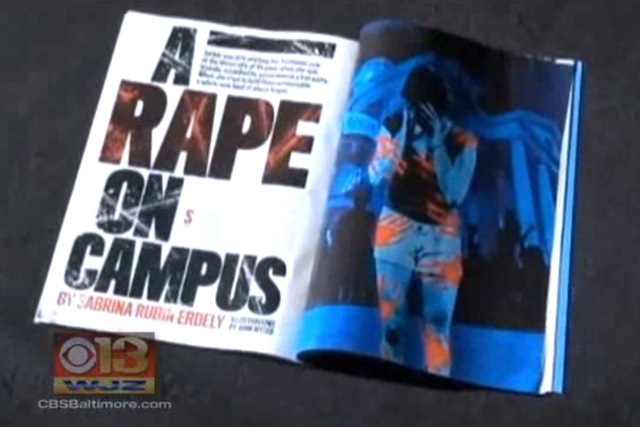Court revives lawsuit over debunked Rolling Stone rape story
NEW YORK — A federal appeals court Tuesday revived a defamation lawsuit by three University of Virginia graduates against Rolling Stone magazine, its publisher and a reporter over a now-retracted article describing a gang rape.
By a 2-1 vote, the 2nd U.S. Circuit Court of Appeals said George Elias IV, Ross Fowler and Stephen Hadford could pursue claims that the November 2014 article by Sabrina Rubin Erdely, “A Rape on Campus,” was “of and concerning” them under a theory of “small group” defamation.
All three judges on the panel said Elias and Fowler could also pursue individual claims against Rolling Stone, publisher Wenner Media and Erdely.
The court returned the case to U.S. District Judge Kevin Castel in Manhattan, who had in June 2016 dismissed the lawsuit, including claims over a podcast by Erdely.
Wenner is disappointed with the decision but “confident that this case has no merit,” spokeswoman Kathryn Bennett said on behalf of all defendants.
Alan Frank, the plaintiffs’ lawyer, did not immediately respond to requests for comment.
The plaintiffs graduated in 2013.
On Sunday, Wenner said its majority stake in Rolling Stone was for sale, following recent sales of Us Weekly and Men’s Journal.
Erdely’s article described a September 2012 rape of a female student named Jackie at the Phi Kappa Psi fraternity house, and suggested that gang rapes might have been common there.
The article amplified a national debate over sexual violence on college campuses, before questions arose over the reporting.
In April 2015, Rolling Stone retracted the article and apologized to fraternity members, other students and administrators.
The dean of Columbia University’s journalism school issued an accompanying report faulting the article’s lack of corroboration, and calling the case “a story of journalistic failure that was avoidable.”
In Tuesday’s decision, Judge Katherine Forrest wrote for the majority that “university campuses are often intimate communities” and the plaintiffs’ membership in Phi Kappa Psi, a small yet prominent group on campus, supported a defamation claim.
Circuit Judge Raymond Lohier dissented, saying the majority decision permits every Phi Kappa Psi member to hold Rolling Stone liable under New York defamation law.
“Until this error is corrected by the New York Court of Appeals, publishers should beware,” he wrote.
In April, Rolling Stone settled a separate defamation lawsuit by University of Virginia administrator Nicole Eramo, five months after a federal jury awarded her $3 million in damages.

















